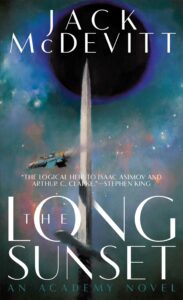The Long Sunset is the eighth book in Jack McDevitt’s series named after the Academy of Science and Technology, whose central character is Priscilla Hutchins, a pilot of interstellar craft generally known by her nickname “Hutch.” Six years ago, when I read Cauldron, I wrote:
The universe that McDevitt has shown through Hutch’s … eyes is a grand one: enough faster-than-light travel to make the space opera work, but enough of the limitations of lightspeed, the immensity of the galaxy, and the implacability of deep time to show that even an earth-based civilization capable of sending ships regularly through interstellar distances is a mere speck in space and time. One of the recurring motifs of the series is that intelligent life and civilizations, even those that reach the stars, don’t last long on a galactic scale. Xenoarchaeologists appear in several books, and some of the most affecting scenes involve civilizations that have been and gone by the time that humans show up. Not all of the civilizations that the archaeologists explore died natural deaths, however; over the course of the series, evidence mounts of something (or rather, somethings) moving through our part of the galaxy at a significant fraction of c, and laying waste to any place with sufficiently high technology.
McDevitt is also particularly good at capturing the grandeur of the universe. Previous books in the series have drawn their tension and conflict from the combination of characters and setting, with the unexpected on alien worlds tripping up Hutch and her companions. I read the first five between early 2008 and mid-2010. I remember enjoying them thoroughly even as I admired the tightness of their construction and McDevitt’s inventiveness with settings that felt both real and alien. Following Hutch’s progress from just another skilled pilot to someone who was also good with guiding people was a deeper pleasure of the series. Cauldron answered some long-running questions but also sketched the end of an era, as the Academy was slipping from its place in people’s priorities.
Between the events in Cauldron and the beginning of The Long Sunset, humanity has continued to lose interest in interstellar exploration. Humanity has not found a peer species, just traces of a few who made it to the stars and then succumbed, in some way, to the ravages of uncounted aeons.
I think McDevitt wanted to write a book about humans encountering aliens who are both peaceable and industrialized. This book would be a counterweight to all of the stories of war stemming from interstellar interspecies encounters, highlighting altruism on both sides, and showing how sentient beings should look out for each other in a universe that’s both utterly indifferent and full of hazards. The Long Sunset gets there eventually, but I thought it took a lot of contrivances to put his characters in a situation where they had to get to know the aliens, and my suspension of disbelief suffered. They have antigravity units but not waterproof personal communications devices? Interstellar drives, but not cloud-piercing radar? The situation is good, the story is compelling, but incongruities like those kept pulling me out of the book. McDevitt is indulging in the old pulp tradition of not letting details get in the way of a good story, but previous books in the series did a better job of letting the details serve a good story, with things clicking into place in a fashion that was both surprising and inevitable once he showed the bigger picture.
There’s also a lot of Earth politics in the first hundred pages of The Long Sunset, and I thought it was a fairly shallow portrayal of how power works. That’s quite apart from McDevitt not addressing how much Earth will likely change in the next 225 or so years. Historical change is a hard problem that a lot of science fiction declines to engage with, and McDevitt has other fish to fry. Or aliens to save, in this case.
There’s a third species introduced in The Long Sunset but Hutch’s crew’s encounter with them is brief. They come off more as a sketch and a link to objects the crew found in deep space than as an interesting set of characters on their own. McDevitt is upending his established portrait of the galaxy — six books without alien interactions, and suddenly two contact species practically at once. It felt less considered than the other books in the Academy series.
The Long Sunset has some amazing scenes in deep space. The altruistic encounter is unusual, and worth doing more often in science fiction. The two alien species offer contrasting portraits of peaceful societies in conditions of material abundance. The book is strong in all of those places; I thought the connecting tissue was not as robust in McDevitt’s other books about Priscilla Hutchins and the Academy.

